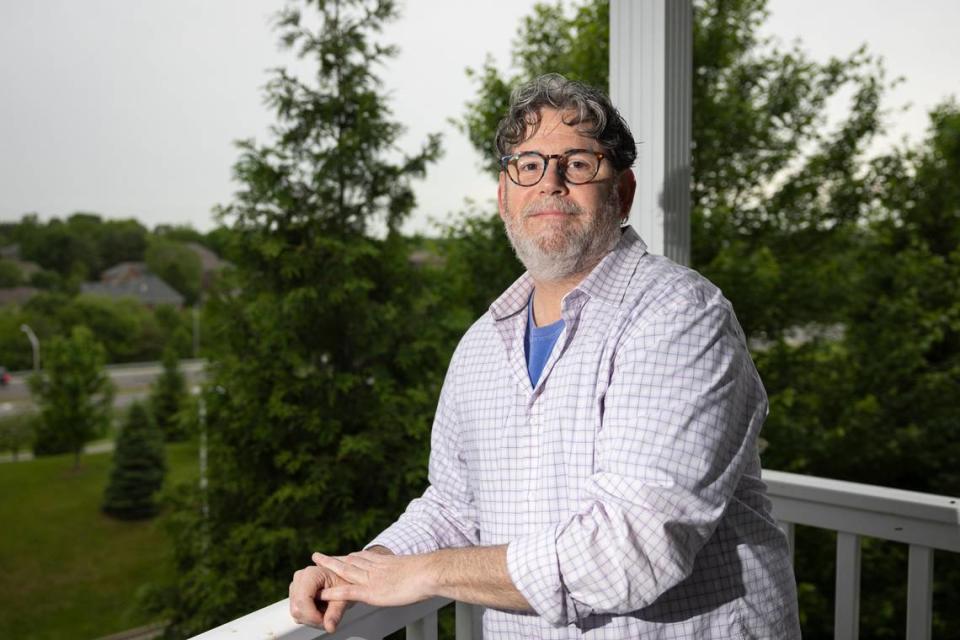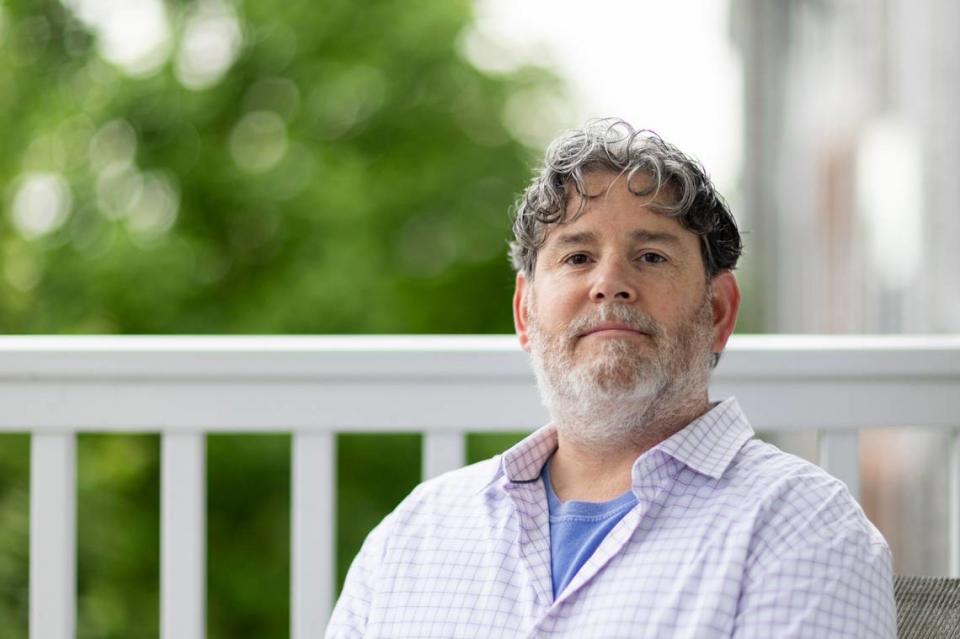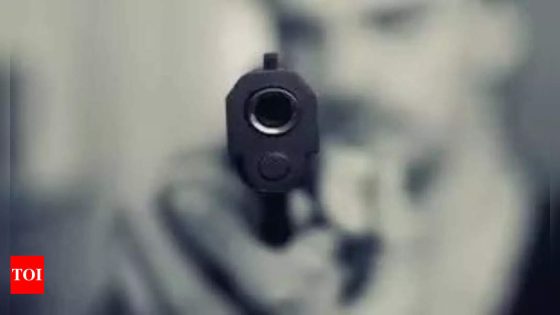After a 21-year career as a Kentucky State Police trooper, John Bradley has swapped his police uniform for a white coat.
On Saturday, the former lieutenant colonel will walk the stage at the University of Kentucky College of Medicine graduation, ready to launch a new career as a pathologist. At 53 years old, Dr. Bradley will be the school’s oldest graduate, about twice the age of the typical med school student.
In the fall of 1988, right out of high school, Bradley enrolled at UK to pursue his childhood dream of working in the medical field. Then, an ironic tragedy struck: He got all As on his first semester report card.
“Probably the worst thing happened to me that could have that first semester. I got a 4.0 grade average,” he said. “As the classes got harder, I started realizing I didn’t really have the academic preparation to be there but, more importantly I didn’t have the maturity.”
No stranger to side quests, Bradley performed in a heavy metal band, Brain Salad, during his first go-around at school. The band made an appearance in the Oct. 3, 1991, edition of Rolling Stone magazine.
Unfortunately, Bradley couldn’t mirror that success in his college classes.
Over the next four years, he was in and out of school. Bradley slowly lost his grip on passing grades and took a step back from college. He put his biology knowledge to use at a lab job.
Though Bradley appreciated his time in the private sector, he felt unfulfilled. He looked to those closest to him for inspiration.
“My uncle is a retired lieutenant colonel with KSP,” Bradley said. “My uncle was not a huge man. He would get out of that cruiser wearing the uniform, and he looked 10-feet-tall to me.”
Over his two-decade career, Bradley held six ranks, climbing all the way to lieutenant colonel, just like his uncle.
While working in Frankfort, he took the chance to go back to school and got a bachelor’s degree in criminal justice from Kentucky State University.
Still, he longed to be a doctor.
“I’d been driving by Chandler Hospital for 30 years, and I would always have just a pang of regret,” he said.
Though he had no intention of returning to school after retiring from KSP in 2017, Bradley found himself back at Kentucky State finishing his bachelor’s degree in biology a mere three months after retirement.
Matured and with a deeper appreciation for school, he graduated as the class valedictorian.
That’s when he knew he wanted to go to medical school, and he knew where. Bradley only applied to one program, UK’s College of Medicine.
Dr. Michael Rankin served on the admissions committee that year. He said Bradley’s life experience and diversity as a nontraditional student stood out.
“He had already shown that he had a keen interest in helping his fellow man. After all, that’s why we all go into medicine,” Rankin said.

His older sister, Geri Bradley, recalled growing up in a mobile home in Beattyville, playing make-believe doctor with her brother. Between imaginary patients, the pair laid on the floor flipping through pages of their dad’s encyclopedia, learning everything they could about the human body.
“John says he’s always looked up to me, but I’ve actually always looked up to him, and he’s my baby brother,” she said. “He’s done everything that I ever wanted to do, and I have lived these last years in his medical school vicariously through him.
“I am so proud of him, I don’t have the words for it.”
Rankin said UK’s alumni data shows doctors who go to high school, college, medical school and residency in Kentucky are likely to keep practicing medicine in the commonwealth. Bradley is a Kentuckian at heart, and plans to keep serving the commonwealth long after graduation.
He starts his pathology residency at UK later this year.
Bradley spent the first three years of medical school intending to become a radiologist. In his fourth year, he took a pathology elective at the state medical examiners office and knew he had to make the switch.
“It was kind of a call back to my police career. As an investigator, I had been to a lot of autopsies and had a lot of interactions with pathologists, even before I really understood that they were truly medical doctors,” he said.
Bradley called pathologists a “doctor’s doctor.” Although he knows he won’t be directly interacting with a lot of patients, he does take the weight of his job very seriously.
He said the police force taught him how to interact with people on the worst days of their lives, a skill that will help him meet people where they are when delivering a diagnosis.
“Your vocation and your profession is not just black and white, but there’s people behind it. People with consequences and people that need to be helped,” he said. “There’s a human being at the other end of that diagnosis.”
During his time on the force, Bradley said he prided himself on his ability to separate work and home. He could hang up his uniform and leave police work at the station. That changed after a particularly tough case in 2002.
As a sergeant at Post 5 based in Campbellsville, Bradley was called in on his day off to assist with a double murder. He answered questions at a news conference and went inside a Gallatin County house to help process the scene.
Two young children, ages 6 and 7, were dead. A third was assaulted and lived.
“I start to walk out the door, and right beside the door there’s three book bags… and then it just hit me all at once. ‘Damn, these three kids were planning on going to school, not the day that they got.’”
He added: “I could feel myself kind of drain. I got out in the yard, and there were three bicycles left the way kids throw them to the four corners of the wind.”
That day was the first time he cried because of something he experienced on duty. The tears flowed for the 50-mile drive back home.


The man convicted of those murders, Marco Allen Chapman, was executed in 2008. Nobody else in the commonwealth has been executed since.
“I can’t think about those book bags and those bikes because that’s when it got real. I couldn’t treat it as an abstraction anymore,” he said.
Looking forward to his career as a pathologist, Bradley doesn’t plan on leaving everything at the office as he once did.
“When I look at a tissue sample or a slide and I see bad news, it’s not just going to be an abstraction in my microscope. It’s going to be a real human being,” he said. “You hope you can give them a diagnosis and ease their suffering, but you’ve got to realize those things represent realness.”
From one childhood dream to the next, Bradley said after a fulfilling medical career he plans to go back to school and get a degree in meteorology.
Insisting that timing has made everything work in his life, Bradley said he is often struck by dumb luck.
“I just don’t have enough sense to know when I’m beat,” he said.
“I just don’t know when to quit.”
Source Agencies


